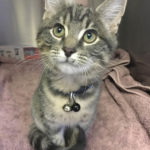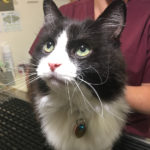Hyperthyroidism is a disease of older cats caused by excessive production of thyroid hormone. The cause is usually a benign overactive thyroid gland located in the neck area and is seen in cats typically ten years of age or older. Thyroid hormone has particular roles in metabolism and iodine storage. While dogs tend to suffer from hypothyroidism or low thyroid levels, cats are generally the opposite. In fact after diabetes mellitus, hyperthyroidism is the second most common hormonal disease in cats. Signs of hyperthyroidism include hyperactivity, weight loss despite a ravenous appetite, increased thirst and urination, frequent crying, poor grooming and a rapid heartbeat. If left untreated this condition can lead to heart failure, emaciation and death. The good news is that diagnosis involves a simple blood test performed by your vet and there are good treatment options. The ideal form of treatment is via a single dose of Radioactive-iodine given as an oral capsule. This is given under the supervision of a veterinary specialist in hospital but is safe and has excellent permanent results. An alternative treatment is an ongoing twice daily anti-thyroid tablet or in cats that are very difficult to pill, a gel applied to their ears. Ongoing regular blood and urine tests are required to monitor this treatment. Vets need to be mindful that older cats may also have concurrent kidney disease which can make treatment more challenging. Speak to your vet if your older cat has any of these clinical signs so they can offer tests and treatment suitable for your pet. Meet April one of our clinic cats at the Hoppers Crossing Vet Clinic.
Subscribe To Our Newsletter
Join our mailing list to receive the latest news and updates from our team.


